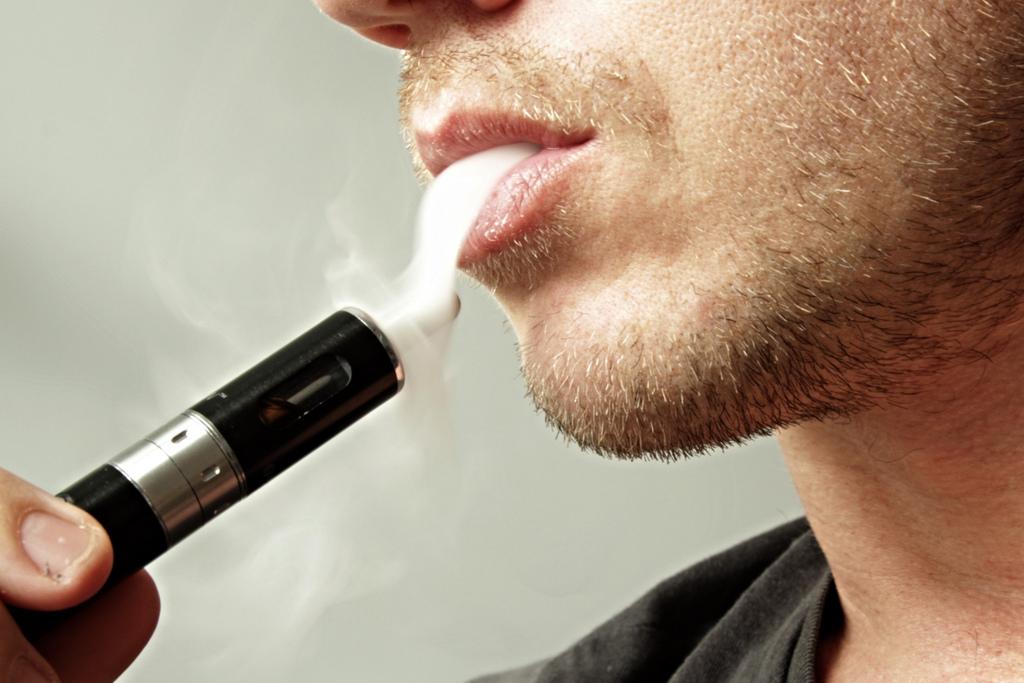What science says about e-cigarettes
Smoking an e-cigarette.
Battery-powered e-cigarettes have become wildly popular over the last decade, especially among teenagers and young adults. At least some of this popularity stems from their marketing as safe alternatives to conventional, combustible cigarettes, as well as their many, often fruity flavors.
But how much do we understand about the safety of e-cigarettes, or the more than 7,000 e-liquids on the market?
“The picture is still unclear,” says Aruni Bhatnagar, a professor of medicine at the University of Louisville. “We do not know to what level or to what extent these devices are safe.”
In conventional tobacco cigarettes, the tobacco is burned and nicotine is transferred into the aerosol. In e-cigarettes there is no burning, but there is a solution of a carrier — usually propylene glycol or glycerol which is heated to allow for nicotine to be inhaled.
“There has been this belief that nicotine by itself is not as particularly harmful and that if you deliver it in a certain way which gets rid of the combustion products, then it might not do as much harm as nicotine,” Bhatnagar says. “But there’s the presence of all the other 7,000 chemicals that are present in regular cigarettes. But since we do not know much even about cigarettes and which particular constituents or chemicals in that cause harm, we can't be sure whether most of them are gone or some of the remaining ones are still associated with residual toxicity.”
Even if e-cigarettes are chemically safer than regular cigarettes, Bhatnagar warns the public health dangers associated with e-cigarettes make them more dangerous than e-cigarette companies claim they are.
“The e-cigarette companies have been claiming that they want to wean people off combustible products and put them onto safer e-cigarette products and that they are doing it to decrease disease and morbidity and mortality in the world,” Bhatnagar says.
“But the problem is that they are at the same time making these e-cigarettes and flavors that would be quite at home at a birthday party of a third grader. So what are they trying to do, we think, is to recruit a new generation of nicotine addicts by enticing them with this variety of different flavors … Health care activists are particularly concerned that this might be [leading] back to the 1960s, where the tobacco companies are luring new addicts into the fold.”
Recently, however, the FDA declared that e-cigarettes, like other tobacco products, may no longer be sold to minors. They’re also requiring manufacturers disclose their ingredients and practices.
“The public health community has universally hailed this regulation as being something which was long awaited,” Bhatnagar says. “In the last two or three years there was a Wild Wild West. People were mixing their ingredients and nobody knew what was in what device and how each device was being operated.
"There were no standards and you could mix your own e-juice in your bathtub and sell it out in your vape shop. It will take two years before everything is put into place and it will require that people at least disclose what is in their products as we do for any other thing that we eat or drink. So we think these are very sensible, useful and timely regulations that were much needed…there is absolutely no other way to have these products on the market without regulation.”
Not only is the safety of e-cigarettes in question. It’s not even certain the e-cigarettes actually help people stop smoking, as e-cigarette makers claim.
“There is some anecdotal evidence and some weak scientific evidence but not rigorous randomized control trials that have shown that they are indeed effective as cesation devices,” Bhatnagar says.
In the end, simply too little is known about e-cigarettes to say whether or not they are safe.
“We are trying vigorously to be able to come out with some useful information about the long term toxicity but it's going to take time,” Bhatnagar says. “We need to see how much disease is increased or decreased with the use of e-cigarettes.
This article is based on an interview that aired on PRI's Science Friday.
Every day, reporters and producers at The World are hard at work bringing you human-centered news from across the globe. But we can’t do it without you. We need your support to ensure we can continue this work for another year.
Make a gift today, and you’ll help us unlock a matching gift of $67,000!
